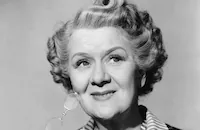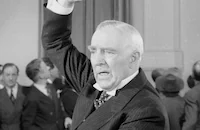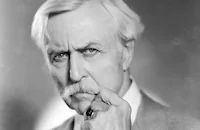Portia on Trial
Cast & Crew
George Nicholls Jr.
Walter Abel
Frieda Inescort
Neil Hamilton
Heather Angel
Ruth Donnelly
Film Details
Technical Specs

Synopsis
Criminal defense attorney Portia Merriman specializes in defending downtrodden women with tactics that often annoy her sometime boyfriend, district attorney Dan Foster. One afternoon, Portia is excited to learn of the arrival of Earle and Richard Condon, the son and grandson of newspaper magnate John Condon, who have been living in England for the past seventeen years. Portia assigns her investigators, Efe and Hank, to keep a close eye on Richard, in whom she takes a particular interest. Later that night, Dan insists on taking Portia with him to a party given by John to celebrate Dan's successful prosecution, thanks to Portia's assistance, of a notorious gang. Portia refuses, however, since John's hatred of her is well-known. Soon after, Portia learns that Richard is ill, and she rushes to the Condon home in a panic. There, it is revealed that Portia is Richard's mother, although he is not aware of this fact. The doctor assures Portia that Richard will recover fully from his fever, and she is allowed a brief glimpse of her beloved son. At a party soon after, Portia tries to break off her relationship with Dan, saying that he cannot afford to be seen with her because he is running for re-election. Also at the party, Earle introduces Portia to Richard and Elizabeth Manners, Earle's English fiancée. Richard is impressed with Portia's wit and beauty, and is delighted when Earle later informs him that Portia is his mother. Portia and Richard soon become friends, much to the chagrin of John, who disapproved of her when she was involved with Earle and forced her to give up all claim to her baby after arranging an annulment of her marriage with Earle. John continues his meddling ways by trying to have Elizabeth deported on moral charges, and a distraught Earle rushes to her apartment. Elizabeth is convinced that the deportation is Earle's doing, and in a hysterical rage, she kills him. Jane Wilkins, Portia's secretary and best friend, convinces her to defend Elizabeth. John tries to get Portia disbarred by presenting the damaging affidavits he forced her to sign seventeen years ago to prevent her from claiming Richard, but Portia outwits him with a legal maneuver and the trial begins. Portia presents a defense of justifiable homicide, showing that Elizabeth was driven to the brink of insanity by John's actions. Portia also reveals that John similarly manipulated her relationship with Earle and that she was nearly driven to murder herself. During Portia's examination of John, he admits that the affidavits are false and takes full responsibility for Earle's death. Dan, who is prosecuting the case, polls the jury, and after they state that Elizabeth is not guilty, Portia and Richard embrace.

Director
George Nicholls Jr.
Cast

Walter Abel

Frieda Inescort

Neil Hamilton

Heather Angel

Ruth Donnelly

Barbara Pepper

Clarence Kolb
Anthony Marsh
Paul Stanton
George Cooper
John Kelly

Hobart Bosworth
Ian Maclaren
Chick Chandler
Bob Murphy
Ines Palange

Leo Gorcey

Huntly Gordon
Marion Ballou
Hooper Atchley
Nat Carr
Lucie Kaye
Crew
Faith Baldwin
Alberto Colombo
Harry D'arcy
Eloise
Albert E. Levoy
John Victor Mackay
Howard O'neill
Samuel Ornitz
Edward E. Paramore Jr.
Murray Seldeen
Harry Wild

Film Details
Technical Specs

Award Nominations
Best Score
Quotes
Trivia
Notes
The opening credits introduce this film as "Faith Baldwin's Portia on Trial." Hollywood Reporter news items provide the following information: Gordon Rigby and Cromwell Ormsby wrote an adaptation of Baldwin's story, but the extent of their contribution to the finished film has not been determined; Helen Gahagan was set to star in the picture, but was replaced by Frieda Inescourt; and Walter Abel and Barbara Pepper were borrowed from RKO for the production. The Variety review listed the picture's running time as 85 minutes, probably in error. The Variety review also noted that "comparison of Walter Abel's work as district attorney in the big court scene with another one in [the 1936 M-G-M film] Fury is inevitable".
According to the MPAA/PCA Collection at the AMPAS Library, after Republic submitted an early synopsis of Baldwin's story to the PCA on March 31, 1936, PCA Director Joseph Breen noted that the synopsis would result in a film that the PCA would have to reject for the following reasons: the heroine was "presented in such a way as to make her unethical acts appear attractive"; adultery was condoned by some of the characters; and it was "indicated that in one case that Portia made an impassioned argument to the jury blaming society as a whole for the unlawful acts of her client, which is definitely contrary to the tenets of the Production Code." Breen again rejected a later version of the script, saying that it was unacceptable because of "an excessive and unnecessary amount of illicit sex" and "the condonation and flavor of justification of illicit sex." Because of this rejection, the script was rewritten. After the film was released, the PCA received a complaint from the Los Angeles Bar Association, but the substance of the complaint is not known. The film was rejected for distribution in Quebec because "undue sympathy [is] created for a murderess." Alberto Colombo was nominated for an Academy Award in the Music (Scoring) category.

Miscellaneous Notes
Released in United States 1937
Released in United States 1937











